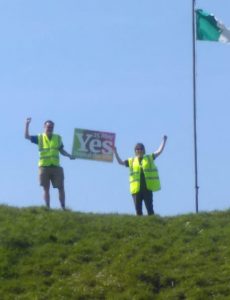
Clare L
It’s around the 23rd of May 2018. Tá an ghrian ag spalpadh. In the tiny hamlet of Glynn, Co Carlow, a red-haired woman and I climb a pole and strap a solitary Yes poster to it. The village is so tiny, not even a No poster has made it in.
The same day, the same place, or maybe in Kildavin, I see the same woman walking doggedly up a country road, seeking out any last houses we may have missed. The air hums with noonday heat. Cow parsley rises in the verge, vetch clambers and collapses over grasses. I’m walking past some one-storey cottages, built from yellow Blackstairs granite. A woman who has travelled home from the Netherlands is talking to a strange man. It’s not clear if he will even vote, let alone vote Yes.
A sign looms out of a driveway, shaded by trees blazing with young leaf. No trespassers, no hawkers, and extensive details of the guard dogs awaiting anyone who dares stride down the cool path. Another house shimmers in the sun on top of a hill, I have to walk up a long driveway to see that the woman sitting on a deckchair in the garden is fast asleep. The silence of daytime is acute. Birds hardly sing. I feel as though these landlocked fields are out of time, and yet people answering doors speak quietly but clearly, they are as aware as we are of what’s at stake. That’s me told.
We drink something cold in a strange, echoey bar and are unselfconsciously complimented by staff. It’s me who has the hang-up, who thinks that nothing has changed since my childhood.
Our three battalions move south, following the route of the wide brown Barrow, and meet in St Mullins. Out in the sun at a picnic table, watching the river flow under the old mill, we compare notes. The man who came from Canada just to canvass didn’t get such a great reception in Clonegal. Maybe Ed Sheeran should come out for Yes, doesn’t he have family there? In the end all the villages say Yes, as though inscribed on their low granite walls.
Before we go we climb up the top of the motte and get photos taken of us waving posters. We walk back to the cars past the old King of Leinster’s grave. Once before, this whole mild landscape rang to calls for Repeal, with Daniel O’Connell leading the great crowds. They didn’t get it though, it took a few generations more to even come close. Our call was not carried by monster meetings, but started in the whispered voices among the cillíns at sunset, building to the drumming feet of the annual march, which kept marching, until the overgrown approach to justice could finally be scythed through.
Everyone piles into cars. I am driven back to the bus stop in town by the red-haired woman, we talk politics as the Blackstairs fade to velvet blue against the dimming sky. Tomorrow morning at 7am we will be shivering outside the granite train station, palming colourful bumpf onto the same commuters as yesterday. The future, the result, hangs and hums like the shuddering heat of midday, suspended. But there will be no need for the faces behind the granite to seek redemption from us. Le chéile ar son Tá. Ceatharlach abú.

